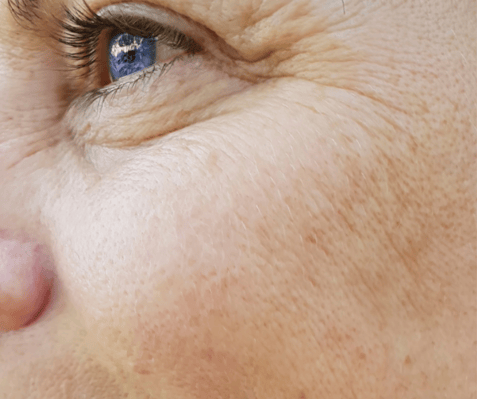Patches of my skin are darkening. Is it skin cancer?
Are you noticing patches of darkening skin on your face and neck? It might be hyperpigmentation. Hyperpigmentation is the appearance of uneven discolouration or dark blotches on the skin. So, what causes it and what do you need to do about it?
What causes hyperpigmentation?
Our skin is naturally coloured, or pigmented, by melanin. Usually the amount of melanin in our skin remains constant. In the case of hyperpigmentation, melanin is unevenly distributed in the skin to create a blotchy appearance.
Hyperpigmentation is mostly caused by sun damage but can also form due to melasma or a hormonal imbalance, which is why the condition is common in pregnancy. Dark spots can also appear as a result of acne or skin injury, and this is known as post-inflammatory hyperpigmentation.
Some people are more prone to developing hyperpigmentation, depending on factors like your lifestyle, genetics and age. It is more common in older people and smokers.

Is hyperpigmentation harmful?
Unevenly pigmented skin is not necessarily harmful, but people with sun damaged skin do carry a higher risk of developing skin cancer due to excessive UV radiation exposure. It is strongly advised that these people get a skin check at least once a year to have the best chance of early skin cancer diagnosis and successful treatment.
Hyperpigmentation is otherwise a harmless cosmetic problem, but it can have a significant impact on your appearance and self-esteem.
What’s the difference between hyperpigmentation and skin cancer?
Hyperpigmentation is the result of an uneven distribution of melanin, which can't harm you. It appears as a small patch that is darker than the surrounding skin. On the other hand, skin cancer is often the result of damage that has manifested into cancerous cells, and will usually appear as a distinct mole or freckle.
However, skin cancer can sometimes also appear as a patch of unevenly coloured skin, which is why it’s very important for anyone suffering from hyperpigmentation to get a skin cancer check.
How can hyperpigmentation be treated?
Before working out how best to treat your hyperpigmentation, you need to know what’s causing it. If it’s caused by sun damage, you need to get a full-body skin cancer check before commencing any treatment for the darkening spots. Skin cancers can appear anywhere on your body – even in places that never get exposed to the sun – so it’s important that you do this regularly.
The cause of your hyperpigmentation will help determine how it’s treated. The main medical treatments for the skin condition include chemical peels, microdermabrasion and skin needling (all treatments in which damaged layers of skin are non-invasively removed to be naturally replaced by new, healthy layers) or LED light therapy.
Don’t forget to always consult a doctor before commencing treatment, and ensure you have an accurate diagnosis that includes the true cause of your hyperpigmentation, as you can further harm your skin by using unsuitable treatment methods.
